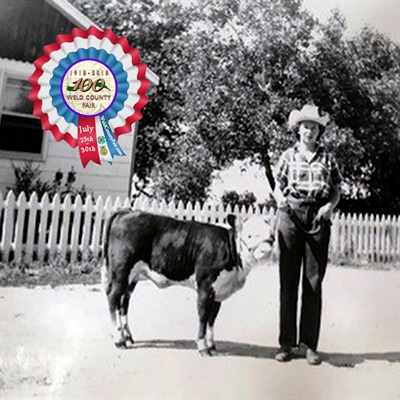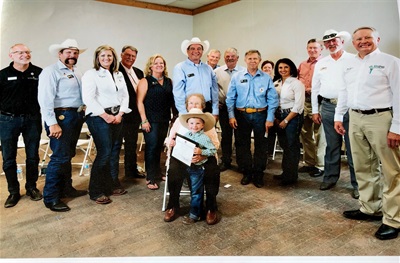Participation in the Fair Leads to Lifetime of Memories
Story by Baker Geist, Weld County Communications Specialist, photos courtesy of Mary Kanode
 Ask any past Weld County Fair participant what they’ve garnered from the experience and it’s possible to get many different answers. For lifetime Weld County resident and Centennial Farm owner Mary Kanode, that answer is simple; enjoyment and the opportunity to be proud of accomplishments.
Ask any past Weld County Fair participant what they’ve garnered from the experience and it’s possible to get many different answers. For lifetime Weld County resident and Centennial Farm owner Mary Kanode, that answer is simple; enjoyment and the opportunity to be proud of accomplishments.
As a member of the Prairie View and Nunn 4-H clubs in 1951 through 1956, Kanode became involved with the Weld County Fair — then the Weld County Junior Fair — showing beef, chicken and sheep in competitions. New to showing animals, she remembers her 4-H leaders encouraging her to be less focused on winning and instead wanting her to just enjoy the experience of the fair.
“It was a real learning experience,” she said of showing animals. “One of the things I remember from the 4-H leader over in Nunn, he said, ‘people who are really winning are spending a lot of money on their animals and I know you can’t do that. You go to the fair and do your very best and have a good time doing it.’ And I did.”
Having lived on the Kanode Ranch all her life, it’s not as though she was inexperienced with animals and livestock prior to the fair. Her family raised chickens, pigs, and cattle when she was little and she and her family continue to raise livestock today. However, competing in the fair presented her an opportunity to learn new skills she wouldn’t have gotten at home.
“I learned about taking care of my cow and calf and about the discipline of breaking animals to lead and to stand. (The fair) was the first time I was ever involved with any competition.”
As she improved in her showmanship, people began taking notice. While her focus wasn’t on winning, eventually she got that experience as well. In 1953, she was named Grand Champion in a competition after showing her cow Lulubelle and her calf Skeeter. She was awarded a trophy by the Crow Valley Livestock Association.
Competing is only one aspect of the fair and Kanode said some of her fondest memories were meeting new people and making new friends. It made the work and dedication required to participate all worth it. She said the sense of community and sense of accomplishment the fair provided is part of what made it all such a unique event each year.
“It was an experience we all really enjoyed,” Kanode said. “If you enjoy an experience, you go back for it.”
It may not have been possible to continually participate in the fair without the support of her family. Looking back, Kanode is appreciative of her mother, Edith Lamm, and father, Keithley Lamm, for the sacrifices they made so that she could attend including letting her have an animal, helping with the feed and making sure she got to the fair; a difficult task given the distance from the family ranch to Greeley. While the trip is approximately 32 miles one-way today, trips took longer in the ’50s in part because of the challenges traveling with large animals presented.
“It wasn’t like you load up a small animal in a horse trailer now,” she said. “It was in a small pickup with a stock rack on it.”
Her parents’ willingness to make sacrifices came from their belief that the fair presented a tremendous value to the family. Kanode’s two older sisters each competed in the fair growing up and it was a priority that each child got to participate because it would serve as a good learning experience.
Competing in the Weld County Fair didn’t end when Kanode finished in 1956 as it’s become somewhat of a family tradition. Each of her three kids and seven grandkids has showed in the fair and they too see the benefit it provides.
“It taught me a lot about responsibility, taking care of livestock and working hard,” said Derek Kanode, one of Mary’s grandchildren.
During his time with 4-H and participating in the fair, Derek showed livestock and managed to win a few ribbons. His final year with 4-H was in 2006, today he works on a ranch and raises bucking bulls. He also believes new fair participants — either in the open division or 4-H competitions — can gain a lot from the experience.
“I think they would learn a lot about leadership and work ethic and just being involved in the community,” Derek said.
The Weld County Fair has grown tremendously since Mary was involved and she said each year she looks forward to seeing the new talents of the children who participate in the various activities. While some of the events are strictly for 4-H participants there are many open division events that allow anyone to participate. When asked what advice she would give to someone participating for the first time, her words of wisdom don’t stray too far from the advice her 4-H leader gave her when she was new.
“Go for it and do your very best,” she said.
KANODE RANCH ONE OF 71 CENTENNIAL FARMS AND RANCHES IN WELD COUNTY
Honored as a Centennial Farm and Ranch in 2017 at the Colorado State Fair in Pueblo, the 1,480-acre Kanode Ranch certainly has a place in Weld County’s agricultural history. Simply driving to the ranch and passing the now abandoned town of Purcell on the way, many questions come to mind about Weld County’s agricultural history. How did the Kanode Ranch begin and why are Centennial Farms and Ranches so significant?
Nestled in the prairie around the Pawnee National Grassland, part of the land the Kanode Ranch sits on was initially homesteaded in 1913 by a Swedish man named Jacob Lekander. Four years later in August of 1917, Mary’s grandparents, George and Myrtle Spicer, bought the land — then 160 acres— and established the ranch.
“My grandparents bought it from the fellow that had homesteaded it,” Kanode said. “He wanted to go back to Sweden.”
Overcoming financial challenges was key in keeping the ranch in the family. Kanode explained that when things were difficult, both her grandparents took jobs on the railroad to make ends meet. That drive and determination was also evident in her parents after they purchased the ranch in 1941.
“My grandma and grandpa were poor and when he couldn’t make a living here he went to work on the railroad. Grandma did too, cooking on the railroad,” she said. “Mom and dad took over with the place and I think of their sacrifices and their hard work to keep the place.”
Not all the challenges were financial, however. Kanode recalls her mother telling of a great grasshopper infestation that spread across Weld County one year which made working outside difficult.
“When the grasshoppers were so bad, if you were hoeing in the field and hung your jacket on the fencepost and worked a few rows in the field, there’d be grasshoppers in the coat.”
Kanode eventually purchased the ranch in 1974. She too has seen the ranch through many challenges including keeping it profitable and not having to sell it. There was even a year when the basement collapsed in her home. She said her ability to be successful running the ranch came from faith in God and the support of family members and friends.
According to historycolorado.com, there are currently 71 Centennial Farms and Ranches in Weld County. Kanode has lived on hers for 78 years and while she said some people can’t wait to leave the hardships of prairie life behind, there are also many benefits she’s not willing to give up anytime soon.
“There’s nothing like seeing the moon start to come up behind the ridge on a dark night,” she explained. “To see that big full moon out there and the beautiful clouds; there’s so much satisfaction.
The significance in Centennial Farms and Ranches can be found by speaking to Kanode and sensing the immense pride she has in her family and in her ranch. It’s been her life’s work and while proud that the ranch has been recognized for its longevity, she’s most proud of it for another important reason.
“This is home,” she said with a smile.

FUN FACT
Kanode’s family history with the fair is longstanding, dating all the way back to 1922 when her mother-in-law, Sarah Kanode, won a ribbon at the Weld County Fair.